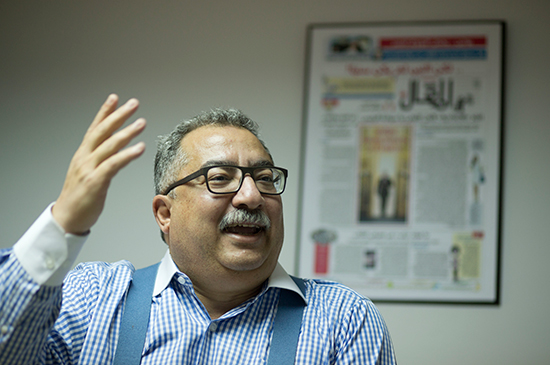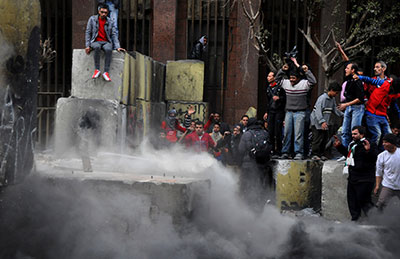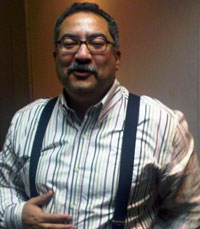
Egyptian parliamentary leaders file criminal complaint against editor
New York, March 1, 2017–Egyptian lawmakers should immediately withdraw their criminal complaint against Ibrahim Eissa, editor of Al-Maqal newspaper, and should stop harassing and threatening journalists, the Committee to Protect Journalists said today.
Egypt sentences journalists to prison for ‘publishing false news’
New York, January 13, 2016 — The Committee to Protect Journalists on Wednesday condemned a Cairo court’s sentencing of three journalists and one press freedom advocate to three years in prison each on charges of “publishing false news” and belonging to the banned Muslim Brotherhood group.
Mission Journal: Who is a journalist in Egypt?
Egyptian journalists, besieged by punitive lawsuits and under threat, agree that under President Mohamed Morsi “there is no press freedom, only the courage of journalists,” as editor Ibrahim Eissa put it. What they can’t agree on is–in a climate of freewheeling, mutable media–who exactly is a journalist?
Online journalist reported missing in Egypt
New York, February 25, 2013–Egyptian authorities must do their utmost to determine the whereabouts and ensure the safety of Mohamed el-Sawi, an online journalist who was reported missing on February 21, the Committee to Protect Journalists said today. CPJ also calls on Egypt to stop using the law to intimidate journalists and prevent them from…

Two years on, Mubarak’s tactics still haunt Egypt media
On the second anniversary of Egypt’s January 25 revolution, Hosni Mubarak’s footprints are still present in many areas of the public sphere–and media are no exception. President Mohamed Morsi needs to cease using Mubarak-era tactics of silencing his critics with criminal charges such as defamation.

Egyptian journalists pressured by military, Islamists
For a few weeks after the overthrow of President Hosni Mubarak, it looked as if Egypt might do the unthinkable and do away with the ministry of information. New publications and TV stations sprouted up, newspaper circulation soared, and a new breed of citizen journalists and bloggers opened a space for reporting and comment that…
Press freedom deteriorates in pre-election Egypt
New York, October 7, 2010–The Committee to Protect Journalists is alarmed by the deterioration of press freedoms in Egypt ahead of November’s parliamentary elections and next year’s presidential vote. In particular, CPJ is concerned over the firing on Tuesday of Ibrahim Eissa, the editor-in-chief and founder of the independent daily Al-Dustour.
Free Maziar Bahari: 100 global journalists petition Iran
Your Excellency: We are writing to express our grave concern at the detention of our esteemed fellow journalist Maziar Bahari and to request his immediate release. Mr. Bahari has been detained since June 21. No charges have been brought against him, and he has not been granted access to a lawyer. As one of the most impartial and committed journalists in his field, he has reported regularly over the past decade from the Middle East, principally from Iran and Iraq, and provided consistently balanced and insightful reports. As an award-winning documentary filmmaker, he has earned global respect for his work.
Attacks on the Press in 2008: Egypt
Egypt took a lead role in developing a regional charter designed to restrict satellite broadcasting throughout the Arab world. At the behest of President Hosni Mubarak, parliament extended the 27-year-old Emergency Law, keeping intact for two additional years a key tool for stifling free expression. In this environment, journalists continued to fend off a rash…